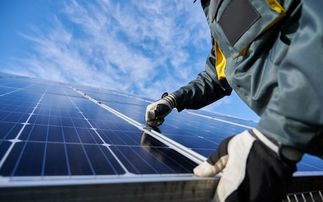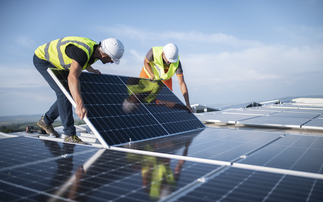Charity Partner for this year's BusinessGreen Leaders Awards warns universal access to clean, affordable electricity by 2030 remains a far off prospect without an investment surge
In the UK and most of the developed world, access to electricity is something we all take for granted. Whether you need to charge a phone, make a cup of tea or watching Love Island, you're never very far from a plug socket.
Yet for hundreds of millions of people around the world, simply having enough light to see anything after the sun goes down is a major challenge, the pursuit of which can have dangerous consequences.
Almost 600 million people in Africa alone have no access to electricity, as a result of which huge numbers rely on expensive, dangerous, and far less eco-friendly alternatives such as kerosene lamps. Not only are these a poor source of light, they emit toxic black smoke that is hazardous for human health and the environment. Moreover, they use around 15 per cent of a family's precious income.
Recognising that burgeoning renewable energy technologies could offer a potential solution to the environmental, health and economic barriers posed by the lack of electricity access, Jeremy Leggett - founder of UK solar developer Solarcentury - set up SolarAid in 2006.
The organisation, which will be the charity partner at tomorrow's BusinessGreen Leaders Awards, says its foremost aim is to eradicate the kerosene lamp entirely from sub-Saharan Africa by replacing them with solar powered lights. It may still be far from reaching that overarching goal, but since its inception SolarAid claims to have given 10 million people in Africa access to safe, clean, solar-powered lights, saving families a total of $440m and averting more than two million tonnes of CO2.
And, in doing so, it has also helped establish a new market for solar lighting in Africa, according to John Keane, who took over as the charity's new CEO last September.
"I was in the organisation from the start, so I was there for about nine years in various different roles," he tells BusinessGreen. "Basically I've re-joined at a time when the off-grid sector, as we call it, is now a growing market, so it's quite different to a few years ago when there really wasn't much going on. There is a lot of activity now and a lot of people talking about SDG7, which has only been around since 2015."
One of the UN's 17 Sustainable Development Goals (SDGs) which countries have agreed to meet by 2030, SDG7 specifically targets universal access to affordable, clean energy through greater investment in a wide range of renewable sources and energy efficiency.
For Keane, electricity access is a critical issue, as it impacts on people's economic opportunities and without it, very few of the other SDGs - such as the first SDG to eradicate poverty, for example - are achievable.
"Electricity access, for me is fundamental," he argues. "You really are tying your hands behind your backs if you haven't got access to electricity. I just don't think that in the development sector that's recognised as much as it should be. It doesn't just impact people in their house, there's the opportunity in their local economy. If an entrepreneur wants to set up a business, but hasn't got access to electricity, they're kind of hampered. That's what lack of electricity does - it limits you."
However, Keane harbours deep concerns that achieving SDG7 remains a far off prospect, as there is not yet enough action underway on the ground from governments and companies to spread electricity access. This is where SolarAid comes in, he says, although major challenges remain.
"In a way, we don't want SolarAid to exist by 2030, and I don't think it should have to even today, but it does and we need to because the money and investment isn't going into actually providing access and electricity," he says. "It's a huge problem."
The future business opportunities of establishing a new clean electricity market in developing countries are obviously considerable, he explains, but the short term barriers are significant.
"I think a lot of investors like to invest in companies for profit, and that's fine and there are a lot of full profit companies coming into the space in which we operate, but ultimately they can't really make a profit out of serving the poorest people with just basic lighting," says Keane. "I think our own challenge is to be able to explain that, to say 'look it's all very good building a market, and we've tried to do that, but that market will never reach everybody'. Our big challenge is trying to communicate that as best we can."
Keane compares the situation to that of the UK around 10 or so years ago, when the government came in with subsidies to get the renewables market moving. Now, while those subsidies have subsequently been cut back, there are major subsidy-free projects getting off the ground in the UK. Subsidies, therefore, could be key to kick-starting a renewables market in Africa and helping ensure electricity access to the hundreds of millions of people currently without, argues Keane.
"It's a slightly different context, but I think the markets we work in deserve subsidy," he says. "Why is it being left to relatively small NGOs and pretty small companies to try and address his huge issue? It doesn't seem right. In our market, one private company called Greenlight Planet got $60m-worth of investment, which sounds big but really in global terms it's nothing. That's a massive issue."
All in all, the projections for electricity access are still "pretty gloomy", Keane laments, and he admits he is somewhat pessimistic about SDG7 being met by 2030. "In a weird way it is my job [to be pessimistic]," he says. "We have to operate under the assumption, unless proven otherwise, that SDG7 will not be hit. And if SDG7 is not hit, I believe that most of the SDGs won't be hit. So to me fundamentally, many of the SDGs won't be hit and I can't sit here and say I think it's going to be fine, because I really don't think it will be. Actually, it's only a couple of years ago that the UN and all these governments signed up to the SDGs, and it's easy to sign up to something that it 12 years away, but time goes quickly."
The Sustainable Development Goals are not just an issue for developing countries, either, but should be of primary concern to more developed economies, Keane argues, pointing to high levels of migration from developing nations which have led to crises, political tensions, and instability all across Europe, the Middle East and the USA in recent years.
He calls recent political tensions a "wake-up call" for governments over the importance of achieving the SDGs. "It's fundamental," he says. "If you've got such inequality in the world, in terms of the economies and living environments, then people are going to try to move to places where they've got more opportunities."
For now, the focus remains on further rollout and access to solar powered lights, but for SolarAid this progress is only a small part of the journey towards wider energy access. As such the charity is also starting to explore means of providing renewables-powered stoves for cooking, village electricity charging stations, and irrigation pumps.
But despite the challenges the sector faces, Keane finds solace and room for optimism in ever improving technologies and the downward trajectory of solar and battery costs, which he believes will play a key role in the securing wider access to electricity and helping to eradicate poverty.
"It's still early on in our journey of the technology becoming more affordable and better," he says. "There's still more innovation around and over the next 10 years we're going to see more business models created off the back of all that."
With forecasts pointing to the addition of hundreds of millions of people to the global population over the coming decades, the challenge of meeting SDG7 over the next 12 years is undoubtedly daunting. But even if from the current vantage point it may be hard to see the goal, for Keane and SolarAid, the rewards from striving towards the 2030 target are immense, and will help improve the lives of millions along the way. The race is on.









